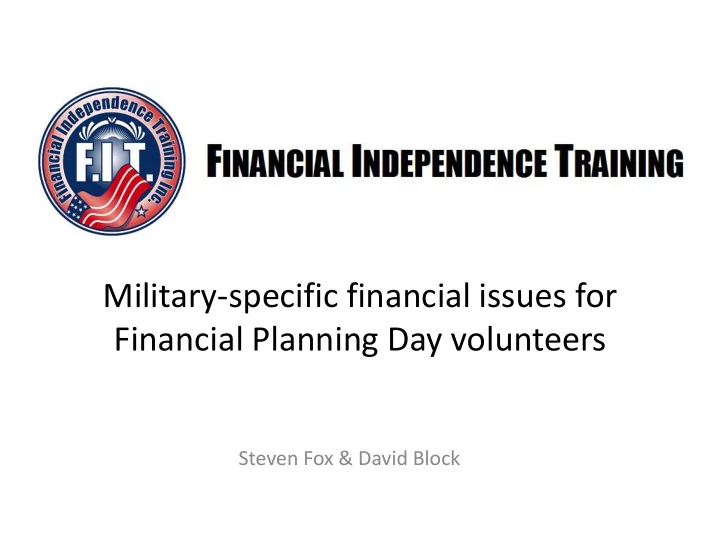

Military-specific financial issues for Financial Planning Day volunteers Steven Fox & David Block
Topics we’ll cover today • Intro to F.I.T. and guide to next Financial Planning Day at MCAS Miramar in February • Why financial planning is different for military • Basics of military pay and benefits • Intro to veterans benefits • Commonly seen issues among younger and older service members • Service members Civil Relief Act and Military Lending Act • Topics to be aware of when counseling service members
Pro Bono Agreement
Pro Bono Letter of Engagement
Unique aspects of working with military • Typical issues faced (deployments, multiple states, frequent moves, etc) • Active duty pay/benefits much different from civilian pay • Veterans benefits are complicated and important • Readiness issues
Military pay and benefits • Basic pay + allowances – Pay chart – Taxable vs nontaxable – Deployment special pay – BAH/BAS – Leave (including terminal) • Tricare – Not needed for active duty – Reservists – Dependents – Veterans
Thrift Savings Plan • Military version of 401(k) • No match • 5 funds to choose from, as well as target date funds • Low cost, simple funds similar to index mutual funds • Roth option available, especially useful during combat deployments • Upon exit, can rollover to IRA, annuitize, or leave in TSP • Most servicemembers should be using combination of TSP and Roth IRA • See page 23 in handout for further details
Military Pension System • After 20 years of service, receive 50% of base pay for life (including annual raises) • Increases by 2.5% per year afterward, up to 75% after 30 years of service • Health care benefits through Tricare • Sometimes opportunities for early retirement at 10-15 years with lump sum payouts • Entirely separate from VA and veterans benefits
Servicemembers Group Life Insurance • Standard benefit $400K, option to select lower amount. Spousal policies for $100k • Paid for by service member • No exclusion for death in war zone, unlike many commercial policies • Separate from death gratuity of ~$100k • Can convert to VGLI within 120 days of separation • Sufficient amount for most service members, but some may need additional coverage
GI Bill • Differences between MGIB and Post-9/11 GI Bill • Post 9/11 – Tuition paid directly to school – Veteran received BAH at E-5 rate w/ dependents (proportional during partial months) – Book allowance of $1000 per year – 36 months of benefits • For dependents of disabled veterans rated 0% or higher, California offers College Fee Waiver program
Disability Compensation • Upon separation, apply for benefits through Veterans Administration • Service-related injuries are added up and veterans given a percentage rating • 10% or higher rating results in monthly payments, 50% or higher means full health care coverage at VA facilities for life (separate from Tricare, and not for dependents) • Veterans who deployed to Iraq or Afghanistan receive 5 years of health care benefits regardless of disability rating
Common financial issues among younger service members • Basic budgeting and cash flow management, overspending (particularly vehicles) • Lack of knowledge about basic personal finance issues such as credit scores, interest rates, etc • Many of them making more money than they ever have, with low fixed overhead costs • Most don’t save enough, teach about opportunity cost and time value of money
Common financial issues among older service members • Many are uncertain about career path after retiring from military in late 30’s or early 40’s. Career counseling may be as important as financial planning • Need help with the same retirement planning issues as regular civilians. Many will have been counting on pensions and not saved much in TSP or other retirement savings accounts • Sometimes have houses in multiple states if they changed duty stations and couldn’t sell or decided to hold it and rent it out • Military spouses often have difficulty establishing a stable career with frequent moves, especially if they work in a job that requires state by state licensing such as teachers
SCRA and MLA • Service Members Civil Relief Act – Provides for right to terminate housing leases upon receiving PCS or deployment orders – Caps interest rate at 6% for some types of debt incurred before going active duty • Military Lending Act – Caps the APR on payday loans, credit cards, vehicle loans, and some other types of debt at 36% for active duty
Key topics to cover while counseling active duty service members • Expected length of remaining service and preparation for exit – Adequate savings – Help them to understand true value of military benefits that they’ll have to make up for with higher pay at civilian job (housing, insurance, taxes, etc) • Basics of time value of money and starting to save/invest early • Explain that taking action now is far better than doing so later. Give a couple examples from our experiences
Where to learn more • MilitaryOneSource.com • VA.gov • Military.com • Veterans of Foreign Wars • Disabled American Veterans • Personal Financial Management Specialists aboard local bases • FIT-Inc.org • Additional resources on handout
Recommend
More recommend